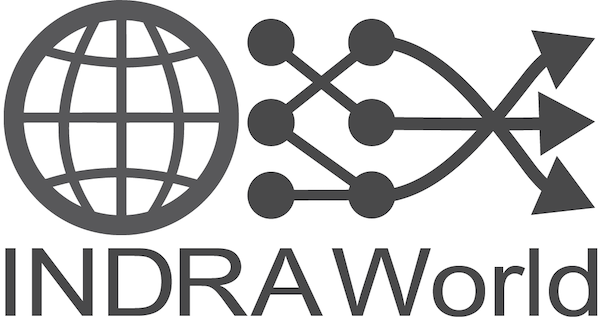INDRA World interfaces with four machine reading systems which extract concepts, events, and causal relations from text (typically reports from governmental and non-governmental organizations, news stories, and scientific publications). The extractions are processed into a standardized Statement representation and then processed (filtered, normalized, etc.).
INDRA World makes use of the general INDRA assembly logic to find relationships between statements, including matching, contradiction, and refinement (i.e., one statement is a more general or more specific version of the other). It then calculates a belief score which is based on all available evidence directly or indirectly supporting a given statement.
This repository also implements a database and service architecture to run INDRA World as a service that integrates with other systems and supports managing project-specific statement sets and incremental assembly with new reader outputs.
INDRA World can be installed directly from Github as
$ pip install git+https://github.com/indralab/indra_world.git
Additionally, INDRA World can be run via Docker with public images available through Dockerhub. For more information, see https://github.com/indralab/indra_world/tree/master/docker.
Detailed documentation is available at: https://indra-world.readthedocs.io/en/latest/.
The INDRA World command line interface allows running assembly using externally supplied arguments and configurations files. This serves as an alternative to using the Python API.
usage: indra_world [-h]
(--reader-output-files READER_OUTPUT_FILES |
--reader-output-dart-query READER_OUTPUT_DART_QUERY |
--reader-output-dart-keys READER_OUTPUT_DART_KEYS)
[--assembly-config ASSEMBLY_CONFIG]
(--ontology-path ONTOLOGY_PATH |
--ontology-id ONTOLOGY_ID)
--output-folder OUTPUT_FOLDER
[--causemos-metadata CAUSEMOS_METADATA]
INDRA World assembly CLI
optional arguments:
-h, --help show this help message and exit
Input options:
--reader-output-files READER_OUTPUT_FILES
Path to a JSON file whose keys are reading system
identifiers and whose values are lists of file paths to
outputs from the given system to be used in assembly.
--reader-output-dart-query READER_OUTPUT_DART_QUERY
Path to a JSON file that specifies query parameters for
reader output records in DART. Only applicable if DART
is being used.
--reader-output-dart-keys READER_OUTPUT_DART_KEYS
Path to a text file where each line is a DART storage
key corresponding to a reader output record. Only
applicable if DART is being used.
Assembly options:
--assembly-config ASSEMBLY_CONFIG
Path to a JSON file that specifies the INDRA assembly
pipeline. If not provided, the default assembly
pipeline will be used.
--ontology-path ONTOLOGY_PATH
Path to an ontology YAML file.
--ontology-id ONTOLOGY_ID
The identifier of an ontology registered in DART. Only
applicable if DART is being used.
Output options:
--output-folder OUTPUT_FOLDER
The path to a folder to which the INDRA output will be
written.
--causemos-metadata CAUSEMOS_METADATA
Path to a JSON file that provides metadata to be used
for a Causemos-compatible dump of INDRA output (which
consists of multiple files). THe --output-path
option must also be used along with this option.
The CLI can also be invoked through Docker. In this case, all CLI arguments that are paths, need to be made visible to Docker. To do this, the -v flag can be used to mount a host folder (in the command below, [local-path-to-mount] into the container on a given path. All CLI path arguments then need to be given with respect to the path as seen in the container. Furthermore, if any of the files referred to in CLI arguments themselves list file paths (e.g., the value of --reader-output-files), those paths need to be relative to the Docker container's mounted volume as well.
docker run -v [local-path-to-mount]:/data --entrypoint indra_world indralab/indra_world:latest [cli-arguments]
